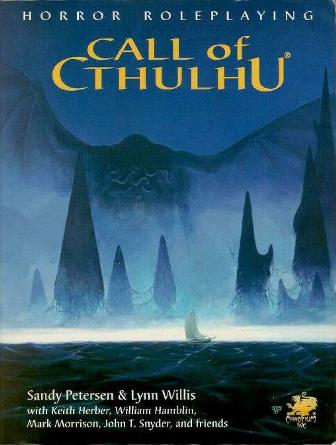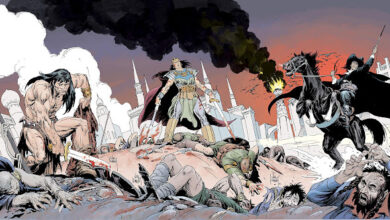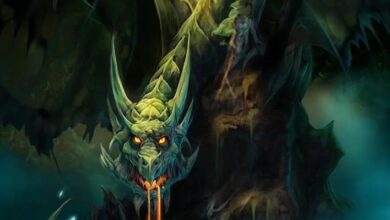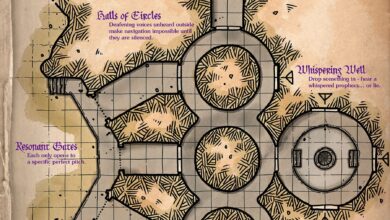Culture Clash | Burn After Running: RPG One-Shots

We’ve all got our own tastes and foibles when it comes to TTRPGs. But more than that, we’ve got established play cultures in our groups that we not only evolved to suit our own tastes, but that we assume everyone else enjoys. Recently I’ve encountered two quite different play cultures to mine, and I wanted to examine them here, and why I found them tricky.
While you’re reading this, I should tell you about my Patreon. Patrons get access to content 7 days before they hit this site, the chance to request articles or content, and the chance to play in one-shot games, for a very reasonable backer level of £2 per month. If you like what you read, want to support the blog, and have the funds for it, please consider supporting here. Telling people about the blog, and sharing links/retweeting is much appreciated also – thanks!
Ye Olde Call of Cthulhu
At Chaosium Con UK earlier this year, a couple of my games as a player were like this – and I know from talking to friends (who also fit into my preferred style of play) that this was also the case. I’m calling it Ye Olde Call of Cthulhu because (a) I think 99% of all convention games probably used to be like this, and (b) the Lovecraftian gradaddy of horror gaming certainly has a proclivity towards this. Here’s some aspects of the culture:

- Long sessions. 4 hours in a convention is barely enough – several games ran over, some tried to rearrange second sessions. I’ve seen games of The Necropolis offered in 4 hour slots – it’s a 1 hour demo scenario (check it out in AP form here)!
- Slow, slow pace and then a frenetic finale. Investigations can be ponderous. Players pore over carefully constructed handouts. Spotlight is secondary to “creating an atmosphere.” I get bored.
- Spot Hidden is rolled all the time. Many, many stakes-free perception checks. “My players like rolling dice” as a replacement for things actually happening. No real consequences for failure, and sometimes little to gain from success.
It doesn’t have to be like this! Call of Cthulhu is certainly an idiosyncratic game, but it’s not a terrible one. Most of the advice in its own Keeper’s Guide would overcome these issues – this play culture is from people still playing like they used to in the last century.
This is very, very much not for me – I will not enjoy a game in this structure. Read the Keeper’s Guide! Inject some action and interest into your games! Or at least pre-warn me so I don’t accidentally sign up for something like this.
Nu-D&D
I’ve started running a few one-shots at a board games venue near me. It’s 2024 rules, 3rd level, show up for a session, bish bash bosh. The punters are all new-ish to D&D, with a handful of folks who are brand new and a few who’ve got many hours of Baldur’s Gate under their belts but not so many round a table with dice. I’ve had to scrabble a bit to get my 2024 D&D chops ready – and I’ve run there twice now, using two excellent pre-written scenarios (M.T. Black’s The Dawn Chasers and Clayton Notestine’s Invaders of Atlantis)

Here’s what I’ve seen of the play culture this generates:
- Bring your own PC. Generally, the expectation is that you’ll have your own character, on D&D Beyond. Whether you are familiar with what that character can do is variable – D&D Beyond makes it really easy to throw together a PC, which is great – but I’ve had to field lots of questions around how their PC’s abilities work.
- Goofiness abounds. I’ve had a lot of ‘joke’ PC names in these sessions. Enthusiasm and an attempt to not appear a grump has meant I’ve not vetoed them, but I do want to ask if calling your PC “Splurge” is going to be funny in 30 seconds time, let alone for the next 4 hours.
- Non-optimal play. This is great, right? PCs aren’t always using their highest stat for their class, spells are chosen because they look cool, tricks and weird strategies abound in combat. This is all great – I’d love it if I was running a system that supported this; D&D does not. These people need FATE – Create Advantage and use your Aspect to tag-team with another player! Or almost any other trindie RPG!
Unlike the previous play style, I can deal with this. It’s not unpleasant, and it’s a good way to spend an evening if everyone’s having fun. My disconnect is that we’re using D&D – a complex system where complexity is part of the charm – to do this loose, action-heavy goofy play. Is Critical Role like this? Maybe – but there are other APs that aren’t (not just us, either – Dimension 20 has a strong engagement with the rules in their shows). I’d happily play in this style – I’m just struggling a bit to GM in it!
Common Threads
There’s a few things that, despite their disparate origins, these cultures have in common. A session is 4 hours, and it’s for 6 people. Both of these things aren’t my favourite – I’d go one less in each case. If you’re running a one-shot, you can run it in 3 hours, whatever the system.
So what to do? I’m a gaming optimist – if there’s stuff I don’t like, I want to be the change and show how it can be done differently, gradually shifting the TTRPG landscape more to my tastes.
So, here’s my actions – I’m going to try and get my ducks in a row with the D&D nights and present some alternatives – hacking D&D a little so I can draw folk into my preferred play culture. What I’ve seen already – introducing 13th Age montages and a bit more player agency – has worked well, and I’m curious to see if I can work to bring some other techniques in.
And I’m going to run Call of Cthulhu at conventions. Hopefully I’ll get some of the Ye Olde players in my games, and it means I don’t have to play it. They may well tire of my handing out Spot Hidden information for free or an overly frenetic pace – but it’s worth a shot, right?
Have you had any play culture clashes? How have you dealt with them? Let me know!



